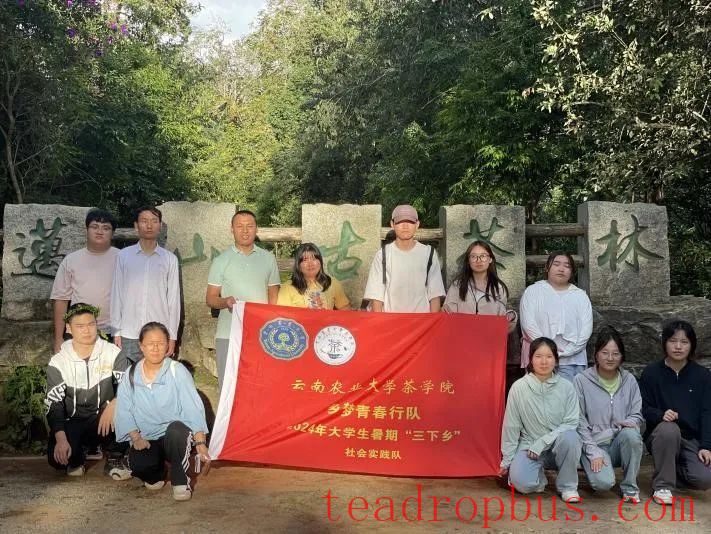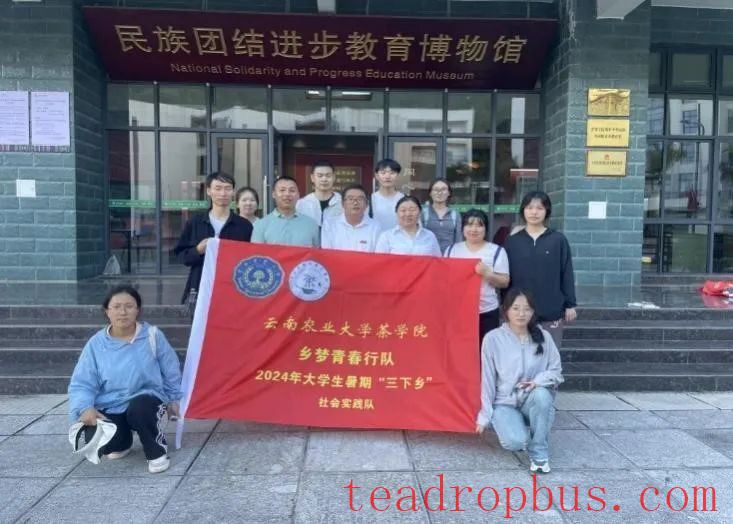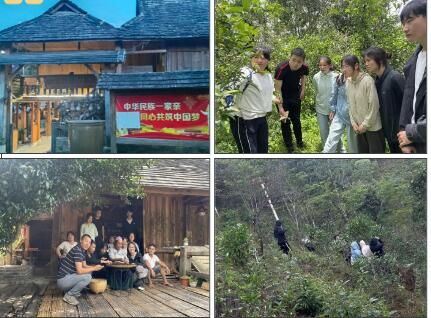Exploring the Secrets of Ancient Tea Mountains
Agricultural Science and Technology Enriches Rural Communities
Summer “Three Rural Areas” Social Practice by Yunnan Agricultural University's Tea College
College Students' Social Practice Team Visits Lancang County

Visiting Lancang County, Pu'er City
In the summer of 2024, faculty and students from the Tea College and the College of Plant Protection formed a rural revitalization practice team called “Rural Dreams Youth Expedition,” with the theme “Rural Revitalization, Youth in Action.” They delved into Pu'er region, Jingmai ancient tea forests, and the Farmer Academician Science and Technology Service Station to conduct a summer “Three Rural Areas” social practice. Led by Professor Jiang Bingbing from the Tea College, Professor Guo Cunwu and Hu Yangshan from the College of Plant Protection, Vice Secretary Yu Xueyuan from the University's Youth League Committee, and Assistant Researcher Ma Yuqing from the Tea Research Institute of the Agricultural Sciences Academy, the team consisted of eight students from both colleges. Filled with passion for Tea culture and a deep affection for rural areas, they embarked on a practical journey, integrating learning in the tea mountains with fieldwork.

This “Three Rural Areas” social practice aimed to combine agricultural science and technology with the realities of rural areas, assisting in enhancing local agricultural production levels and promoting rural economic development and ethnic unity in border regions. It also brought the classroom to the fields, where theoretical knowledge was put into practice in tea forests, fostering a deeper love for tea science, plant pathology, ethnic culture studies, and other related disciplines among the students. With great enthusiasm, team members engaged in a series of diverse social practices focused on rural revitalization, ethnic unity, patriotism education, and grassroots services. They worked closely with local villagers to explore the future of agriculture in Lancang County, learning about tea cultivation and the making of White Tea, stir-fried green tea, and black tea while sowing seeds of youthful enthusiasm and aspirations on this land full of promise.
The “Rural Dreams Youth Expedition” conducted market research and tastings of tea products in the urban area of Pu'er. The team visited the teahouse “Midi Renjia,” tasting and discussing the market sales, processing, and brewing of Pu'er raw tea, Pu'er ripe tea, white tea, and other products. At the “Ethnic Unity Progress Education Museum” of Pu'er College, they received a unique patriotic education. The museum exhibited numerous valuable artifacts and materials, transporting team members through time into the historical river of Pu'er, allowing them to feel the unique charm of ethnic culture and the importance of ethnic unity progress.
In the ancient and vibrant lands of Jingmai Mountain, students from the Tea College fully leveraged their professional strengths to conduct in-depth research and practices related to rural revitalization, ethnic unity, and grassroots science and technology services. They focused on the local agricultural industry's development, actively participating in ecological civilization construction, ethnic unity progress, legal education, and folk culture. Teachers turned the tea mountain into a classroom, providing vivid explanations on various types of pests and diseases, enriching teaching methods and content. Students gained a deep understanding and assimilation of professional knowledge, enhancing their perception of their field of study and promoting discipline and professional development. Through field investigations in ancient tea forests and in-depth exchanges with tea farmers, the team provided scientifically sound suggestions for controlling tea sooty disease and tea looper infestations in local ancient tea forests. They recommended gradually planting tree species that are incompatible with tea sooty disease and suitable for intercropping with tea trees, such as camphor trees. For the outbreak of tea loopers during the Spring Tea season, they suggested using biological control measures like hanging phototactic lamps, insecticidal lamps, releasing pheromones, and plowing in autumn and winter to reduce pest populations and lower the risk of outbreaks in the following spring. These control recommendations protected the ecological environment of local ancient tea forests and provided technical support for the tea industry to promote rural revitalization. During interactions with local farmers, the team also gained insights into existing issues in the front lines of tea production, inspiring them to think critically about the focus of their future studies and work and offering suggestions for scientific workers in combining theoretical knowledge with practical technological services.

The team focused on ethnic tea culture and folk research, surveying villages inhabited by different ethnic minorities, including Dai, Bulang, Lahu, and Hani. The ancient Dai Village in Lancang Lahu Autonomous County, Huimin Town, Pu'er City, has a long history and rich cultural heritage. The village preserves relatively complete Dai culture and the original appearance of an ancient village, surrounded by ancient tea trees, and traditional handmade tea-making techniques create a smoky atmosphere. Team members shared tea and conversations with the Dai residents, experiencing their hospitality and kindness. This harmonious exchange and interaction embodied the strong power of ethnic unity, acting like an invisible bond connecting all ethnic groups without distinction. The team surveyed the thousand-year-old Bulang ancient village hidden in the mountains, where cultural traditions remain intact and the original folk customs are distinct. The village's housing, appearance, customs, and clothing are well-preserved, and the Bulang people continue to maintain and pass down the oldest ethnic cultures and local customs. Team members engaged warmly with the villagers, listening to the village's history and legends. In the ancient village, slogans promoting ethnic unity, such as “One Family of All Ethnic Groups, Working Together to Build the Chinese Dream,” are ubiquitous, serving as powerful proof of ethnic minorities in border areas actively maintaining ethnic unity and aspiring for shared development.